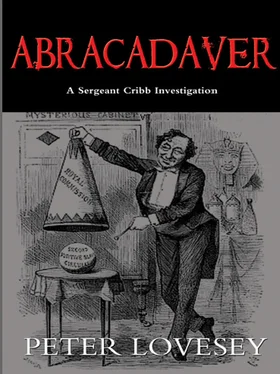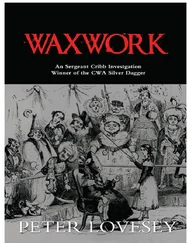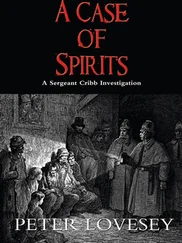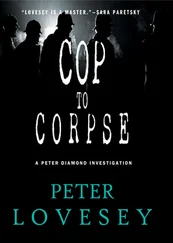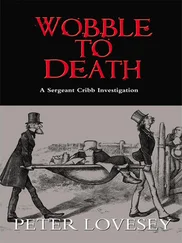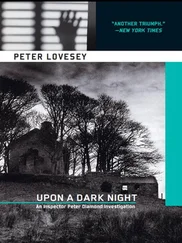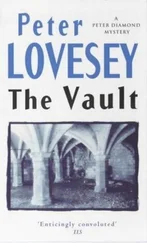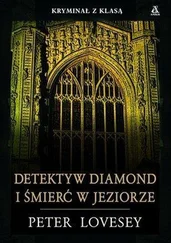Thackeray broke in. ‘Albert’s alive and well, sir. He walked out to the cab himself.’
The Major received the good news in silence, pursing his lips and staring past Thackeray towards the gaunt exterior of St Thomas’s. As the cab started across Westminster Bridge he removed his Post Office cap and buried his right fist in its centre. ‘Alive and well, you say. Would have been my first murder case, you know, and dammit, I had it solved.’
‘I’m sorry,’ said Thackeray. ‘I hadn’t thought of it that way, sir. Perhaps we’re on to a case of kidnapping, though.’
The Major was dubious. ‘There’s nothing to compare with a murder, Constable. It would have been in The Times. Very good for business, a mention in The Times. You’re quite sure it was Albert? Easy to impersonate a limping man, you know.’
‘I’m quite sure.’
The cab raced under the shadow of Big Ben, weaving a devious passage through a line of almost stationary buses and vans. Occasionally a pedestrian or a bicyclist appeared unexpectedly in front of them. Not for the first time, Thackeray was conscious of the vulnerable position of passengers in hansoms, with traffic hazards almost within touch, while the driver sat secure and aloft in charge of their safety. Any mishap now could result in a most embarrassing situation, Westminster being B Division and Scotland Yard so near.
‘Do you really ask us to believe, sir, that you are a detective constable wearing a borrowed knickerbocker suit, travelling in the company of a private detective at a reckless speed through a Division not your own in pursuit of three innocent men and a trunk?’ A nightmare.
‘I can see them, I think,’ said the Major as they turned past the Guildhall into Broad Sanctuary. ‘If we get a clear run in Victoria Street we’ll catch ’em.’
‘I wasn’t instructed to do that, sir—unless they committed a serious crime, of course. My orders was to keep an eye on Albert. I’d be obliged if we could keep ’em in sight without overtaking ’em.’
The Major seemed satisfied. He gave instructions to the cabman and then turned back to Thackeray. ‘Very proper, too. Give ’em enough rope and they’ll hang ’emselves, eh? I might see my name in The Times yet.’
‘It would be my duty to intervene if I judged the young man’s life to be in danger, sir,’ said Thackeray. ‘You’ll pardon me for asking: how did you come to be in Little Moors Place this morning?’
‘Another surprise, eh?’ said the Major, recovering his spirit. ‘Well, I questioned scores of people at the Grampian last night. Heard some damned disquieting rumours. Performers unaccountably missing after they’d had one of those accidents we’ve been so troubled about. I may tell you that I had my doubts about you and your sergeant when I heard that. Dammit, man, you spirited Albert away pretty sharply last night, didn’t you? Well, as a consequence of all these stories, I decided to keep a watch on our friend Albert. His mother gave me the address.’
‘Did your questioning produce any information I should pass on to Sergeant Cribb, sir?’
The Major shook his head. ‘Deuced disappointing. You know, the class of person you get in music halls doesn’t impress me much, Constable. Very narrow existence. Ask ’em a civil question and they’re liable to become positively abusive. Precious little concern among ’em for their fellow artistes’ misfortunes, I can tell you. Hello! Enemy in sight. Not too close, driver!’
Four-wheelers were less common than hansoms in Victoria Street, but there must have been a dozen in the line of traffic that stretched ahead from the Army and Navy Stores to Victoria Station. Fortunately that trunk on the roof was as sure a sighting-point as a top-hat in church. The Major’s hansom pulled smartly into the main stream behind a phaeton. ‘Nice-actioned horses,’ he commented with a nod. ‘Making for Hyde Park, I dare say. Better class of person on this side of London.’
Past the station the traffic became less dense and moved at more of a canter as they approached Hyde Park Corner along Grosvenor Place. ‘Wouldn’t mind a turn along Rotten Row myself this morning,’ said the Major, but Thackeray was looking towards St George’s Hospital on his left. The journey continued through Knightsbridge and the Kensington Road. Here a certain tension was detectable in the Major. He smoothed the front of his uniform and fastened a button, replaced the cap on his head and arranged the strap of the post-bag symmetrically across his chest. Thackeray straightened his deerstalker, uncertain of the reason. It was made clear seconds later when the Major stiffened in his seat and executed a smart eyes right towards the Albert Memorial.
The cab with the trunk turned right in High Street, Kensington, into Kensington Palace Gardens. ‘This is a private road, postman,’ the cabman called down to the Major. ‘Shall I follow?’
‘If you please, but if they stop I want you to drive past slowly.’
As the hansom sedately pursued its quarry down the elegant avenue, Thackeray mopped his forehead with a large handkerchief. Where was the logic in this case? It would take a smarter detective than he to trace a connexion between these fine houses, neighbours of a royal residence, and Newgate jail. There wasn’t one without wrought-iron gates and gravel drive and steps up to the front entrance.
About two hundred yards from the Bayswater end, the four-wheeler turned into the drive of a mansion fronted by a white wall with eagle-topped pilasters.
‘Slowly past, and then halt fifty yards along the road,’ ordered the Major.
Thackeray thought he glimpsed Albert standing at the foot of the steps watching the trunk being unloaded, but it was difficult to observe anything in more than a flash between thickly planted conifers at the front of the house.
‘Philbeach House,’ read the Major aloud. ‘Means nothing to me.’ When the hansom was stationary he turned to Thackeray. ‘You won’t do much more observing unless you climb a pine-tree, Constable, and I don’t recommend that. What does Scotland Yard do now?’
Thackeray pushed open the door. ‘I noticed a gardener in the place next door. I’ll try to have a word with him.’
The knickerbockers were exactly right for Kensington Palace Gardens. The gardener actually doffed his cap. ‘Ah yes, sir,’ he replied. ‘That’s Philbeach House all right.’
‘And who is the owner?’
‘Why, Sir Douglas Butterleigh, the gin manufacturer. A millionaire, they say, and a very decent gentleman too, however he came by his money. He doesn’t live there, you know. Were you looking for him?’
‘As a matter of fact, no,’ said Thackeray. ‘Who is the resident there, then?’
The gardener cackled. ‘Now you’re asking! I’d say there’s twenty or more residents in Philbeach, by the comings and goings I see while I’m clipping my roses here. And very odd some of ’em are, sir. But that’s part and parcel of life in the theatre, so I understand.’
‘Theatre?’
‘Well, the music hall, Sir Douglas maintains a home for music hall performers who’ve come upon hard times. A very decent man.’
CHAPTER
7
‘SCOTLAND YARD AIN’T THE Bank of England,’ grumbled Sergeant Cribb. ‘Four shillings! That’s what I pay for a week’s rent in married men’s quarters. I don’t know what came over you, Constable, lording it across London in a hansom. How can I put that down as reasonable expenses? You might at least have taken a bus back.’
Thackeray accepted the rebuke. Better to be shamed by the rough edge of Cribb’s tongue than by a bus journey in knickerbockers. He would never disclose the real reason for that expensive return-journey. Confidences of that nature were best kept from Cribb.
Читать дальше
